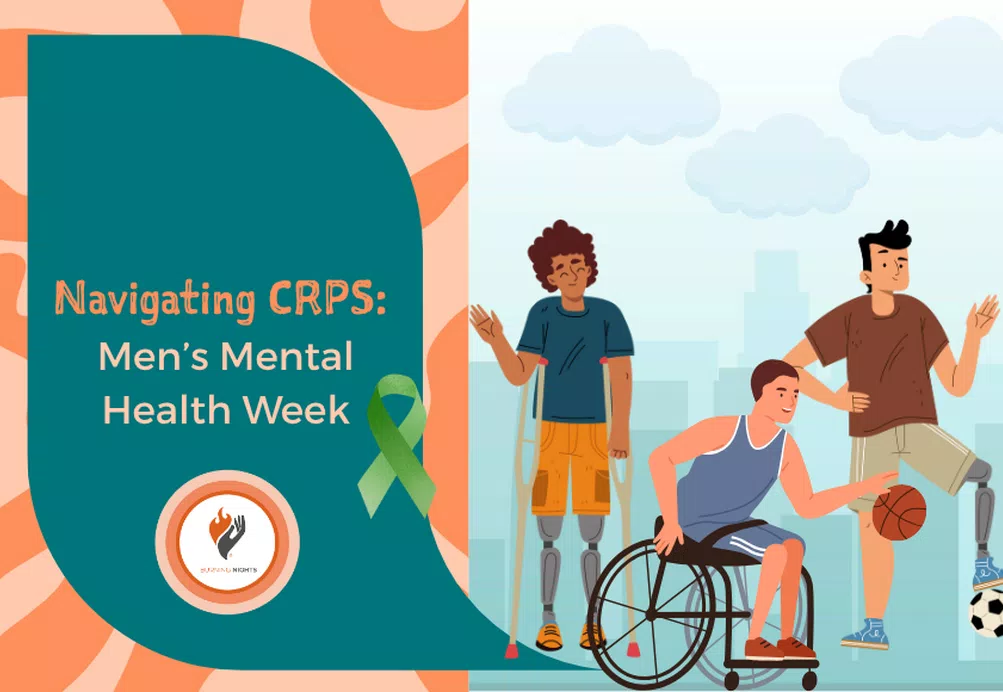We use cookies to improve your experience. By accepting you agree to our cookie policy

We know that Complex Regional Pain Syndrome (CRPS) is a condition marked by severe, prolonged pain. It often follows injury that typically affects one limb, with the pain experienced much greater than would normally be expected from that initial injury. And symptoms may include swelling, changes in skin temperature and/or colour, and reduced mobility.
But what do we know about CRPS in men?
As part of Men’s Health Week, we’re putting the spotlight on not only how CRPS affects men and the ways in which men may be affected differently to women.
Recent research published in the Journal of Medical Genetics showed that men may be genetically more likely than women to experience to CRPS Type 1. The work carried out by the Cambridge Institute for Medical Research “supports an underlying genetic predisposition to CRPS-1 in up to one third of cases, with this effect being most prominent in males.” [1] Although a small study and the Cambridge team believes that larger numbers are needed, men should nonetheless be alert to possible CRPS symptoms for the reasons outlined below.

Understanding the role of gender in CRPS can help with effective management and support. Some ways in which men may experience the condition differently:
Men may be conditioned to ‘tough out’ pain, which can mean a delay seeking medical help, a particular problem for CRPS where early diagnosis important in achieving better results. As CRPS can be particularly difficult to diagnose, there’s a risk of the condition worsening if symptoms are not reported early enough.
The ‘male’ hormone testosterone plays a significant role in how CRPS appears and progresses. Men typically have higher levels of testosterone than women, which can affect the level of pain they feel and how the body responds to inflammation.
Testosterone can also affect the body’s reaction to injury and pain, which can lead to differences in how CRPS symptoms develop and persist. For instance, higher testosterone levels may alter the severity of pain and inflammation experienced by men compared to women. Understanding these hormonal impacts is helpful for creating effective, gender-specific treatments that address the unique ways CRPS can affect men.
We know that living with CRPS can lead to significant emotional and psychological challenges including anxiety, depression and feelings of isolation.
One study also highlights that “male CRPS patients used more extreme words” to describe pain, as well as using less active ways of coping with it. The research also indicates that men may be “being more likely to suffer from depression” and be reluctant to be mobile due to the fear of triggering more pain. [2]
For men reluctant to let on that they feel vulnerable or to seek mental health support, dealing with CRPS can be more difficult, yet essential to ensure that they get effective care.
4. Employment and identity
Some men find their sense of identity and self-worth is closely tied to the work they do and in providing for their families. The debilitating nature of CRPS can interfere with careers and finances, which may lead to feelings of inadequacy.
There is help for men with CRPS including steps you can take yourself.
Seek early Diagnosis: The earlier you are diagnosed the better for managing CRPS effectively. If you think you have CRPS, get in touch with your healthcare provider as soon as possible.
Connect with support groups: The Burning Nights CRPS Support website has an online forum and regular online support groups for CRPS patients, which also offers a sense of community so that you feel less alone with your condition. Visit https://www.burningnightscrps.org/support/ for help in ways that work for you.
Explore treatment options: From physiotherapy to medication and counselling, there are a range of approaches that can help with CRPS.
Men with CRPS should feel they can communicate openly with their healthcare providers. Helping Burning Nights CRPS Support to raise awareness is one way of doing just that. The more healthcare providers and people generally know about CRPS, its symptoms and impact, the easier it becomes to get those all-important early referrals.
Some men may wish to tell their personal CRPS stories, while others choose to campaign for our charity. Or raise money to contribute to our vital work. Perhaps you’d like to become a member of Burning Nights CRPS Support? Find out more by following the links below:
Raising awareness is one of the most significant ways to support men with CRPS and break down the stigma surrounding chronic pain and mental health. Our charity has many blog articles dedicated to CRPS that also recognise the importance of education – not only for patients but also for families, employers and communities.
If you or someone you know is experiencing symptoms of CRPS, do explore our wealth of information available online and remember to consult healthcare professionals early.
Together we can create a more empathetic and supportive environment for everyone affected by this condition. You are not alone.
[1] Shaikh SS, Goebel A, Lee MC, et al. Evidence of a genetic background predisposing to complex regional pain syndrome type 1. Journal of Medical Genetics 2024;61:163-170.
[2] https://onlinelibrary.wiley.com/doi/full/10.1002/ejp.1375
We use cookies to improve your experience. By accepting you agree to our cookie policy
 £
£